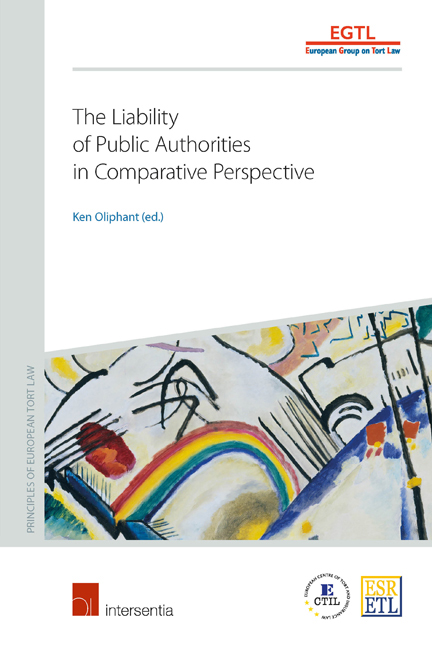Book contents
- Frontmatter
- Preface
- Contents
- List of Authors
- Introduction
- Questionnaire
- PART I PUBLIC AUTHORITY LIABILITY OUTLINED
- Austria
- Belgium
- Czech Republic
- Denmark
- England and Wales
- France
- Germany
- Greece
- Israel
- Italy
- The Netherlands
- Norway
- Poland
- Portugal
- South Africa
- Spain
- Switzerland
- The United States
- European Union
- The Liability of Public Authorities: an Economic Analysis
- PART II CASE STUDIES
- PART III CONCLUSIONS
England and Wales
from PART I - PUBLIC AUTHORITY LIABILITY OUTLINED
Published online by Cambridge University Press: 27 November 2017
- Frontmatter
- Preface
- Contents
- List of Authors
- Introduction
- Questionnaire
- PART I PUBLIC AUTHORITY LIABILITY OUTLINED
- Austria
- Belgium
- Czech Republic
- Denmark
- England and Wales
- France
- Germany
- Greece
- Israel
- Italy
- The Netherlands
- Norway
- Poland
- Portugal
- South Africa
- Spain
- Switzerland
- The United States
- European Union
- The Liability of Public Authorities: an Economic Analysis
- PART II CASE STUDIES
- PART III CONCLUSIONS
Summary
INTRODUCTION
OVERVIEW
In most respects, but not without exception, the State and its emanations are subject to the ‘rule of law’ which, as interpreted by the 19th-century constitutional historian AV Dicey, entails their equal subjection – in common with persons generally – to the ordinary law administered by the ordinary courts. The principle applies to every public body and every public official. Generally speaking, public bodies and public officials are therefore subject to the same tortious liabilities as private persons. They are not liable without more for causing damage in breach of their duties or in wrongful exercise of their powers. The circumstances must be such as to make out the elements of a recognised ‘tort’ or to trigger the obligation to provide just satisfaction for violation of the Human Rights Act 1998 (HRA). As regards liability in tort, the principles applied have for the most part been developed through judicial decision, though statute has also played a role – for example, in establishing additional liabilities and removing certain common law restrictions on liability. Fault is almost always required. In terms of practical significance, the three most important bases of claim against a public authority in tort are negligence, breach of statutory duty and misfeasance in public office.
Dicey's idea of equality before the law – though it holds good to a considerable extent – is subject to a number of exceptions: (a) there is one tort, misfeasance in public office, that applies only to public officials; (b) particular public officials (eg judges) benefit from a general immunity from tortious liability; (c) various conceptual devices restrict the tortious liability of other emanations of the State (justiciability, discretion, the policy sphere); (d) the courts tend to be more willing to negate a duty of care for reasons of public policy where a public defendant is involved; (e) punitive (or exemplary) damages may be awarded for ‘oppressive, arbitrary or unconstitutional action by the servants of the government’ in circumstances where no such award would be possible against a private person; and (f) the liability to compensate under the HRA is exclusive to public authorities. These points of distinction are elaborated further in the analysis below.
- Type
- Chapter
- Information
- The Liability of Public Authorities in Comparative Perspective , pp. 127 - 154Publisher: IntersentiaPrint publication year: 2016

